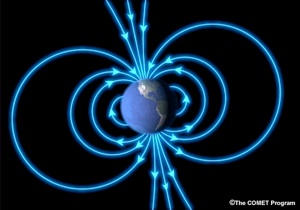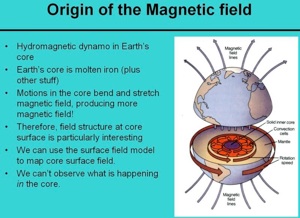Rocks preserve magnetic patterns that reflect magnetic fields that are different from today. Today’s magnetic field resembles a bar magnet which is nearly but not exactly parallel to the N and S rotational pole. The constant motion of the molten core, together with earth’s rotation, maintains the field.





The lavas of the Keweenaw are full of magnetic minerals which have strong magnetic orientation which is quite different from the current magnetic field. In fact they show a N pole in approximately the position of Tokyo, Japan and reflect a tropical latitude of about 10 degrees N.
The study of old magnetic fields as preserved in rocks has taught us much about the earth, including major support for the whole theory of plate tectonics. Animals, including birds and insects use magnetic fields of the earth to navigate. A practical link to our daily lives is the compass.

